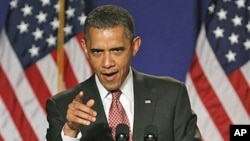White House officials have outlined broad themes of President Barack Obama's address next Wednesday to the United Nations General Assembly. A key focus of the address and Obama's meetings on the sidelines, will be democratic transitions and ongoing struggles for freedom in the Middle East and Africa, along with Mideast peace efforts.
Since the president's last address to the General Assembly, the world has seen the wave of uprisings against dictatorial leaders across the Middle East and North Africa, the so-called Arab Spring.
Briefing reporters, White House Deputy National Security Adviser Ben Rhodes pointed to dramatic changes in places like Egypt, Tunisia, and Libya.
Obama also will discuss what Rhodes called the "ongoing struggles for democratic change in Syria" where an uprising against President Bashar al-Assad and his government has claimed at least 2,600.
Iran will figure in the president's speech in two contexts. Obama likely will note, as he did in his major Middle East policy speech earlier this year, that Iranians protested in the streets long before the start of the uprising in Tunisia that triggered similar events in the region. He also will discuss Iran's nuclear ambitions.
Additionally, Obama is likely to renew the connection he and U.S. officials have drawn between Iran and Syria, what Rhodes called "great hypocrisy" in the Iranian government, which responded to protests by its own people with suppression, supporting a brutal crackdown in Syria.
The Arab Spring, and ways the United States, Europe and other countries can support young democracies also will be one focus of Obama's meetings with leaders during his two days in New York.
He will meet with the chairman of the Libyan Transitional National Council, Mustafa Abdel Jalil, to discuss support for the post-Gadhafi transition and participate in a multilateral meeting hosted by U.N. Secretary General Ban Ki-moon.
Support for democratic transitions will be a key part of Obama's discussions with Turkey's Prime Minister Recep Tayyip Erdogan, who the White House says played an important role in Libya. Erdogan visited Libya this week.
Obama also will meet with President Nicolas Sarkozy of France, which with the U.S. played a lead role in the initial military offensive against Gadhafi forces. The French leader visited Libya along with British Prime Minister David Cameron.
Heather Conley, Senior Fellow and Director of the Center for Strategic and International Studies [CSIS] Europe Program and a former deputy assistant secretary of state, said European leaders are taking satisfaction from outcomes in Libya helped by their strong leadership.
"A European re-awakening, we talk about the Arab awakening, but a European re-awakening in its foreign policy efforts towards North Africa and the Middle East," said Conley.
Much of the attention in New York this year will be focused on Palestinian plans to seek a United Nations vote declaring an independent Palestinian state, a move strongly opposed by the United States. Palestinian President Mahmoud Abbas said Friday he will ask the U.N. Security Council to vote on the issue next week.
But National Security Council official Rhodes said it still wasn't clear which among several possible strategies the Palestinians will pursue in New York.
Jon Alterman, is Director and Senior Fellow of the Middle East Program at the Center for Strategic and International Studies [CSIS].
"The United States finds itself in an impossible position, says it will veto the resolution in the Security Council, and will once again end up on the wrong end of a lopsided vote in the General Assembly surely leading to all sorts of complaints that the administration has no credibility on the international stage," said Alterman.
The White House said President Obama will meet with Israeli Prime Minister Benjamin Netanyahu, though it said no meeting is currently planned with Palestinian Authority President Mahmoud Abbas.
President Obama's other bilateral meetings in New York include those with Japan's new prime minister Yoshihiko Noda, and a meeting with the leader of the world's newest nation, South Sudan, President Salva Kir.
In discussing what Obama will say to the General Assembly, about the Palestinian issue, White House official Rhodes cited South Sudan as an example of what can come from successful negotiations with the support of the international community.
Other bilateral meetings on the schedule include meetings with Afghanistan's President Hamid Karzai and Brazil's President Dilma Rousseff.
Obama UN Speech to Focus on Democratic Transitions
- By Dan Robinson





